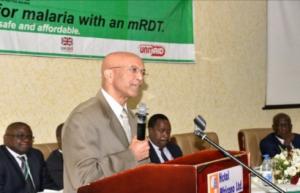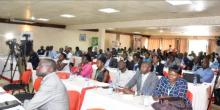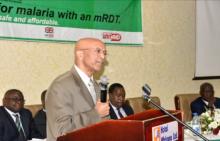Malaria Consortium disseminates a mid-term evaluation report on a UNITAID supported project "Use of Quality assured malaria Rapid Diagnostic Tests (mRDTs) in the Private sector"
Kampala, 27thst October 2015:- Malaria Consortium organized a meeting to share lessons and challenges in implementing the UNITAID project that encourages using malaria Rapid Diagnostic Test (mRDTs) in the private sector including drug shops and pharmacies in order to increase the number of malaria patients who get treatment after a confirmatory test at Hotel Africana.
The meeting was opened by the Minister of Health (MOH) Hon. Dr. Elioda Tumwesigye. He highlighted the tremendous progress made by the government in malaria control over the past 5 years with a reduction in malaria prevalence from 42% to 19% in Uganda according to the Malaria Indicator Survey (MIS). He further said that this improvement in statistics showed that interventions like the increased use if Insecticide Treated Mosquito Nets from 33% to 74% and from 44% to 75% among children under 5 and pregnant women, respectively has been effective. Hon. Elioda also thanked partners Malaria Consortium (MC) and WHO for the great partnership they have accorded to MOH in curbing malaria.
The World Health Organization (WHO) Country Representative, Dr. Wondimagegnehu Alemu in his speech highlighted the importance of testing before treating malaria stressing the policy of test, treat and track. He further said that Malaria is still one of the major priorities for WHO in Sub-Saharan African citing the 6 million deaths due to malaria every year. He further stressed the need for the country to align with the Global Malaria Technical Strategy and incorporate the Malaria Reduction strategy of Uganda which is welcomed by the WHO.
The UNITAID project which encourages use of mRDTs in the private sector is implemented by Malaria Consortium and Foundation for Innovative New Diagnostics (FIND) in collaboration with WHO Malaria Control Programme (MCP) and other regulatory bodies. The 3-year project aims to cover 8 districts in
the western and mid-western regions including Wakiso district. The first phase of the project covered Wakiso district and an evaluation was conducted in order to learn lessons in preparation for expansion to the other 7 other districts.
WHO recommends that every suspected malaria case be confirmed by parasitological testing using RDTs. The availability of high-quality, inexpensive RDTs in the public sector has significantly improved and expanded diagnostic testing and that uncomplicated malaria can be treated with artemisinin-based combination therapy (ACT). However in the private sector where over 40% of the population in endemic countries seeks care and treatment for feverish sicknesses, RDTs are either nonexistent or more expensive than ACT. This leads to presumptive treatment of feverish sickness with ACT which leads to mistreatment of potentially life-threatening non-malaria feverish illnesses such as dengue fever. WHO recommends that diagnostic testing, treatment and surveillance should be done stressing the need for every suspected malaria case to be tested, every confirmed case be treated with a quality-assured antimalarial medicine, and the disease should be tracked through a timely and accurate surveillance system.
The dissemination meeting was full to capacity with participants from Civil Society Organization, the UN Family, government and the media.
________________________________________
For more information, pleae contact:
Mwebembezi Edmond, Public Information Officer, Tel.: +256 414 335569, Cell.: +256 782 962674, Email: mwebembezie [at] who.int (mwebembezie[at]who[dot]int)






